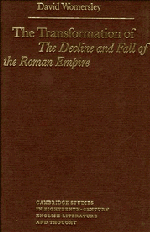Book contents
- Frontmatter
- Contents
- Acknowledgements
- A note on references and quotations
- Introduction
- PART I The historiography milieu
- PART II The Decline and Fall of the Roman Empire
- 3 Introduction
- Volume 1 - 1776
- 4 Style
- 5 Augustus
- 6 Tacitus
- 7 Narrative
- 8 Chapters XV and XVI
- Gibbon among the philosophers
- Volumes II and III - 1781
- Volumes IV, V and VI - 1788
- Appendix
- Bibliography
- Index
7 - Narrative
Published online by Cambridge University Press: 05 September 2013
- Frontmatter
- Contents
- Acknowledgements
- A note on references and quotations
- Introduction
- PART I The historiography milieu
- PART II The Decline and Fall of the Roman Empire
- 3 Introduction
- Volume 1 - 1776
- 4 Style
- 5 Augustus
- 6 Tacitus
- 7 Narrative
- 8 Chapters XV and XVI
- Gibbon among the philosophers
- Volumes II and III - 1781
- Volumes IV, V and VI - 1788
- Appendix
- Bibliography
- Index
Summary
We have considered how Gibbon's style, and his handling of central issues, such as the character of Augustus and the barbarian irruptions, further the dissimulated design of the first volume of The Decline and Fall. By indirectly questioning the traditional explanations of Roman decline – that Rome fell through luxury, or that it fell because of the erosion of civic vigour following the establishment of the principate, or that it collapsed under the onslaughts of the Goths – Gibbon teases his reader about what he sees as the most important cause of the empire's decay. Addison had found the main pleasure of historiography in its creation of suspense:
It is the most agreeable talent of an Historian, to be able to draw up his armies and fight his battles in proper expressions, to set before our eyes the divisions, cabals, and jealousies of great men, and to lead us step by step into the several actions and events of his history. We love to see the subject unfolding itself by just degrees, and breaking upon us insensibly, so that we may be kept in a pleasing suspence, and have time given us to raise our expectations, and to side with one of the parties concerned in the relation.
Gibbon's innovation is to transfer this ‘pleasing suspence’ from narrative to argument.
- Type
- Chapter
- Information
- Publisher: Cambridge University PressPrint publication year: 1988



